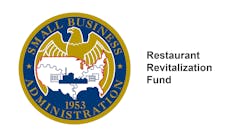NAMA applauds SBA’s eligibility clarification on Restaurant Revitalization Fund grants
The U.S. Small Business Administration has clarified qualifications for Restaurant Revitalization Fund grants, the National Automatic Merchandising Association announced today.
The SBA made the clarification that confirms convenience service operators who provide foodservice could have access to RRF relief in response to a March letter from NAMA president and chief executive Carla Balakgie.
NAMA senior director of external affairs Mike Goscinski issued the following statement on the positive development:
“We were encouraged when relief passed Congress, however convenience services operations with a blended business portfolio including catering, food service and cafeterias were likely to be excluded due to NAICS code restrictions applied to previous COVID-19 relief programs.
“We are pleased with the SBA’s response to our request. This clarity ensures that convenience service operators who provide catering, on-site cafeteria and/or food service will not be inadvertently excluded from access to this much-needed relief. The move allows more small businesses to continue to provide consumers with the products they need at work, at home and at play, as cities and states begin to reopen.”
The American Rescue Plan Act established the RRF to provide funding to help restaurants and other eligible businesses keep their doors open. The RRF provides restaurants with funding equal to their pandemic-related revenue loss up to $10 million per business and no more than $5 million per physical location. Recipients are not required to repay the funding as long as funds are used for eligible uses no later than March 11, 2023.
The NAICS 72 category was initially the eligibility standard for the RRF. NAICS codes that fall under 72 are defined as businesses providing “accommodation and food services."
In her letter, the NAMA chief informed the SBA that many employers in the convenience services industry filing under code NAICS code 45 – “vending machine operators” – actually run “blended” operations that include catering, cafeterias, cafés and ghost kitchens, among other food services.
“The absence of code 45 being specifically referenced risks misinterpretation and the possible exclusion of small businesses intended to be eligible for the grant under the designated fund – even while the code is specifically cross referenced under code 72,” Balakgie argued in her letter.
Operators can learn more about the RRF program here.








